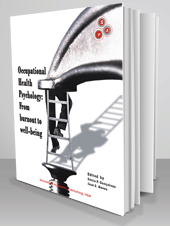Scientific & Academic Publishing
SAP is an open access publisher of journals covering a wide range of academic disciplines.
SAP is an open access publisher of journals covering a wide range of academic disciplines.

Description
This book follows in essence the paradigm shift that has assisted in the research, from a paradigm focused on disease to a paradigm focused on the well-being. This volume presents a wide range of authors from different countries and diversified perspectives that enrich its contents. It consists of seventeen chapters organized in two parts. This structure follows the paradigm shift previously mentioned, thus including studies focused on burnout and well-being so as to understand antecedents and consequences. The structure also replicates the potential side effects of work context. In the first part work context is represented as a noxious environment, whereas in the second part it seems to be a potential motivational and regulatory environment. The first part includes eight chapters that focus on disease and burnout within different professional contexts, namely fire-fighters, police officers, nurses, teachers, white- and blue-collar workers. The second part includes nine chapters that focus on well-being and work engagement, including individual, team and organizational variables and perspectives.
Occupational Health Psychology: From burnout to well-being would be very interesting for students, researchers and professionals from different fields, for instance, Psychology, Work Sociology, Ergonomics, Occupational Medicine and Human Resource Management.
Table of Contents
Preface
Introduction
PART 1 – BURNOUT: NOXIOUS EFFECTS OF WORK CONTEXT
1. Burnout in male Portuguese samples: A comparative study between nurses, teachers and police officers(Cristina Queirós & António José Marques)
2. The role of hardiness in burnout of nurses (Sofia Dias & Cristina Queirós)
3. Job demands in Portuguese Teachers: Lagged, synchronous and reverse effects in burnout (Maria José Chambel & Fátima Ernesto)
4. Sensation seeking and burnout in police officers (António Leitão da Silva & Cristina Queirós)
5. Emotions and burnout experienced by firefighters (Natália Vara & Cristina Queirós)
6. Psychosocial work environment: The moderator role of leader’s support on the relationship between work setting and risk of mobbing (Paola Spagnoli, Ana J. Silva, Anna Venditti, Susana C. Santos, Giancarlo Tanucci & António Caetano)
7. Factorial structure of safety climate scales: A pilot study in Italian metal-mechanic sector (Margherita Brondino & Margherita Pasini)
8. New occupational identities, job security, job satisfaction and work-life balance: Preliminary results from a national survey (Giancarlo Tanucci, Amelia Manuti, Michela Cortini & Paola Spagnoli)
PART 2 – WELL-BEING: MOTIVACIONAL AND REGULATORY EFFECTS OF WORK CONTEXT
1. Organizational culture and work well-being (Sónia P. Gonçalves & José G. Neves)
2. The predictive role of positive job experiences in psychological well-being (Daniela M. Sousa, João Paulo Pereira, Maria João Cunha, Ludovina Azevedo, Pedro P. Lopes & Cecília Loureiro)
3. READY, SET, GO! A Model of the Relation between Work Engagement and Job Performance (Gaby Reijseger, Wilmar B. Schaufeli, Maria C.W. Peeters & Toon W. Taris)
4. Work engagement: An relational approach with the affective commitment (Marta Frazão & Carla S. Semedo)
5. From "I" to "We": The Factorial Validity of a Team Work Engagement Scale (Pedro Torrente, Marisa Salanova, Susana Llorens & Wilmar B. Schaufeli)
6. Building organizational trust through healthy organizational practices (Hedy Acosta, Marisa Salanova & Susana Llorens)
7. Conceptualizing organizational context in relation to employee health and well-being: A qualitative exploration (George Michaelides & Maria Karanika-Murray)
8. Occupational health departments in hospitals: Can they contribute to a positive occupational psychology? (Ema Sacadura-Leite & António Sousa-Uva)
9. Applying Regulatory Focus Theory to Occupational Health Psychology (Lois Tetrick & Clifford Haimann)